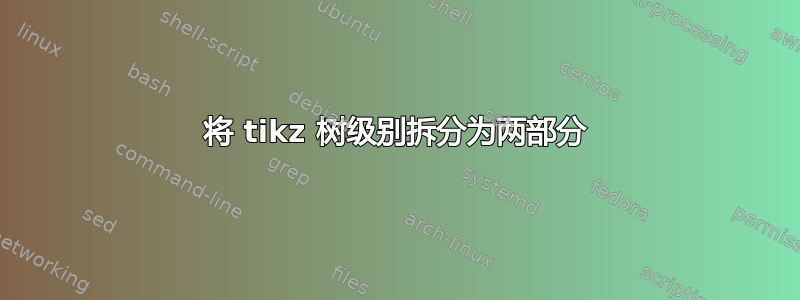
我想为我的学士论文重建这张图形。
我遇到的问题是,我不知道如何在第二层分割图表,如上图所示。我能够重建图形,除了“分割树级别”和图形下方的图例。
解决方案:
%
% rebuild of graphic from
% http://www.w3.org/TR/xmlschema-2/#built-in-datatypes
%
\documentclass[12pt]{article}
\usepackage[utf8x]{inputenc}
\usepackage{tikz}
\usetikzlibrary{trees}
\begin{document}
\begin{figure}[htb]
\centering
\resizebox{\textwidth}{!}{
\begin{tikzpicture}[level distance=1.1cm,
level 1/.style={sibling distance=4cm},
level 2/.style={sibling distance=2cm},
level 3/.style={sibling distance=2.5cm},
box/.style={rectangle, fill={blue!15}, draw, font=\sffamily},
grayBox/.style={rectangle, fill=lightgray, text=black, font=\sffamily, draw},
violetBox/.style={rectangle, fill=violet, text=white, font=\sffamily, draw},
greenBox/.style={rectangle, fill=green!50, text=black, font=\sffamily, draw}]
\node[violetBox] {anyType}
[edge from parent fork down]
child {node[grayBox] {all complex types}
edge from parent[dotted]
}
child {node[violetBox] {anySimpleType}
child {node[box] {duration}}
child {node[box] {dateTime}}
child {node[box] {time}}
child {node[box] {date}}
child {node[box] {gYearMonth}}
child {node[box] {gYear}}
child {node[box] {gMonthDay}}
child {node[box] {gDay}}
child {node[box] {gMonth}}
child {
child [sibling distance = 3cm]{
child {node[box] {string}
child {node[greenBox] {normalizedString}}
child {node[greenBox] {token}
child {node[greenBox] {language}}
child {node[greenBox] {Name}
child {node[greenBox] {NCName}
child {node[greenBox] {ID}}
child {node[greenBox] {IDREF}
child {node[greenBox] {IDREFS}
edge from parent[dashed]
}
}
child {node[greenBox] {ENTITY}
child {node[greenBox] {ENTITIES}
edge from parent[dashed]
}
}
}
}
child {node[greenBox] {NMTOKEN}
child {node [greenBox] {NMTOKENS}
edge from parent[dashed]
}
}
}
}
}
child {node[box] {boolean}}
child {node[box] {base64Binary}}
child {node[box] {hexBinary}}
child {node[box] {float}}
child [sibling distance = 3cm] {
child {node[box] {decimal}
child [sibling distance = 4cm] {node[greenBox] {integer}
child {node[greenBox] {nonPositiveInteger}
child {node[greenBox] {negativeInteger}}
}
child {node[greenBox] {long}
child {node[greenBox] {int}
child {node[greenBox] {short}
child {node[greenBox] {byte}}
}
}
}
child {node[greenBox] {nonNegativeInteger}
child {node[greenBox] {unsignedLong}
child {node[greenBox] {unsignedInt}
child {node[greenBox] {unsignedShort}
child {node[greenBox] {unsignedByte}}
}
}
}
child {node[greenBox] {positiveInteger}}
}
}
}
}
child {node[box] {double}}
child {node[box] {anyURI}}
child {node[box] {QName}}
child {node[box] {NOTATION}}
}
};
\end{tikzpicture}
}
\caption{vordefinierte XSD Datentypen nach \cite{XMLSchema11Specification} Kapitel 3}
\label{fig:xsddatatypes}
\end{figure}
\end{document}
现在看起来是这样的:

PS:在图形内部创建第二个图形作为图例是否合理?有没有更好的方法来制作图例?
答案1
这里有一个带图例的版本:
%
% rebuild of graphic from
% http://www.w3.org/TR/xmlschema-2/#built-in-datatypes
%
\documentclass[12pt, landscape]{scrartcl}
\usepackage[utf8x]{inputenc}
\usepackage{tikz}
\usetikzlibrary{shapes} % rounded rectangle
\usetikzlibrary{trees}
\usetikzlibrary{backgrounds} %framed
\usetikzlibrary{positioning}
\begin{document}
\begin{figure}[htb]
\centering
\tikzstyle{blueBox}=[
rounded rectangle,
fill={blue!15},
draw,
font=\sffamily
]
\tikzstyle{grayBox}=[
rounded rectangle,
fill=lightgray,
text=black,
font=\sffamily,
draw
]
\tikzstyle{violetBox}=[
rounded rectangle,
fill=violet,
text=white,
font=\sffamily,
draw
]
\tikzstyle{greenBox}=[
rounded rectangle,
fill=green!50,
text=black,
font=\sffamily,
draw
]
\tikzstyle{derivedFromList}=[
dashed,
cyan
]
\resizebox{\textwidth}{!}{
\begin{tikzpicture}[
level distance=1.1cm,
level 1/.style={sibling distance=4cm},
level 2/.style={sibling distance=2cm},
level 3/.style={sibling distance=2.5cm},
]
\node (root) [violetBox] {anyType}
[edge from parent fork down]
child {node[grayBox] {all complex types}
edge from parent[loosely dashed, magenta]
}
child {node[violetBox] {anySimpleType}
child {node[blueBox] {duration}}
child {node[blueBox] {dateTime}}
child {node[blueBox] {time}}
child {node[blueBox] {date}}
child {node[blueBox] {gYearMonth}}
child {node[blueBox] {gYear}}
child {node[blueBox] {gMonthDay}}
child {node[blueBox] {gDay}}
child {node[blueBox] {gMonth}}
child {
child [sibling distance = 3cm]{
child {node[blueBox] {string}
child {node[greenBox] {normalizedString}}
child {node[greenBox] {token}
child {node[greenBox] {language}}
child {node[greenBox] {Name}
child {node[greenBox] {NCName}
child {node[greenBox] {ID}}
child {node[greenBox] {IDREF}
child {node[greenBox] {IDREFS}
edge from parent[derivedFromList]
}
}
child {node[greenBox] {ENTITY}
child {node[greenBox] {ENTITIES}
edge from parent[derivedFromList]
}
}
}
}
child {node[greenBox] {NMTOKEN}
child {node [greenBox] {NMTOKENS}
edge from parent[derivedFromList]
}
}
}
}
}
child {node[blueBox] {boolean}}
child {node[blueBox] {base64Binary}}
child {node[blueBox] {hexBinary}}
child {node[blueBox] {float}}
child [sibling distance = 3cm] {
child {node[blueBox] {decimal}
child [sibling distance = 4cm] {node[greenBox] {integer}
child {node[greenBox] {nonPositiveInteger}
child {node[greenBox] {negativeInteger}}
}
child {node[greenBox] {long}
child {node[greenBox] {int}
child {node[greenBox] {short}
child {node[greenBox] {byte}}
}
}
}
child {node[greenBox] {nonNegativeInteger}
child {node[greenBox] {unsignedLong}
child {node[greenBox] {unsignedInt}
child {node[greenBox] {unsignedShort}
child {node[greenBox] {unsignedByte}}
}
}
}
child {node[greenBox] {positiveInteger}}
}
}
}
}
child {node[blueBox] {double}}
child {node[blueBox] {anyURI}}
child {node[blueBox] {QName}}
child {node[blueBox] {NOTATION}}
}
};
\end{tikzpicture}
}
\vspace{\baselineskip}
\resizebox{0.5\textwidth}{!}{
\begin{tikzpicture}[framed]
\node (title) [font=\bfseries] {Legende:};
\node (base) [violetBox, right = of title] {Basis Typ};
\node (primitive) [blueBox, right = of base] {Primitiver Typ};
\node (derived) [greenBox, right = of primitive] {Abgeleiteter Typ};
\node (complex) [grayBox, right = of derived] {Komplexer Typ};
\node (d1) [below = of base] {};
\node (d2) [below = of primitive] {}
edge [] node[swap, align=center]{Abgeleitet durch\\Einschränkung} (d1);
\node (d3) [below = of derived] {};
\node (d4) [below = of complex] {}
edge [dashed, cyan] node[swap, align=center]{von Liste\\abgeleitet} (d3);
\node (d5) [below = of d2] {};
\node (d6) [below = of d3] {}
edge [loosely dashed, magenta] node[swap, align=center]{Abgeleitet durch\\Erweiterung/Einschränkung} (d5);
\end{tikzpicture}
}
\caption{vordefinierte XSD Datentypen nach \cite{XMLSchema11Specification} Kapitel 3}
\label{fig:xsddatatypes}
\end{figure}
\end{document}



